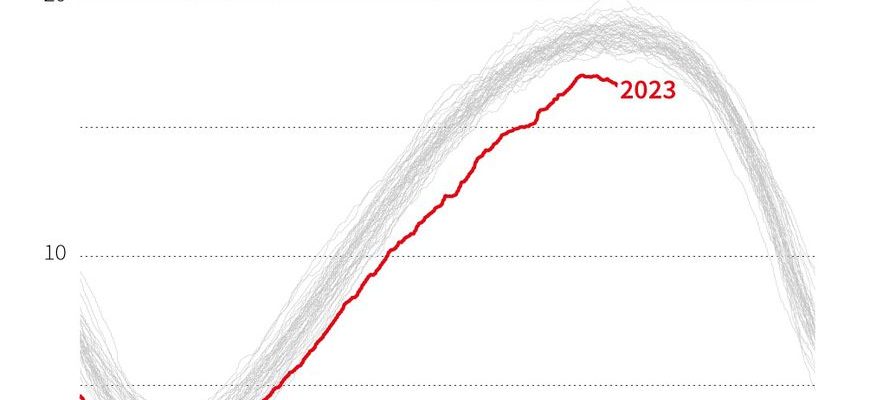Are we heading towards a point of no return? The melting of West Antarctic ice is expected to accelerate considerably over the coming decades and could increase sea levels, even if the world meets its commitments to limit global warming, according to a study published Monday, October 23.
Researchers from the British Antarctic Survey, behind this new study, have warned that humanity has “lost control” over the fate of the ice shelves, these gigantic frozen structures floating on the edge of the main ice sheet and which play a stabilizing role in restraining the drift and melting of glaciers in the ocean.
Accelerated loss of ice
Antarctica has already experienced accelerated ice loss in recent decades and scientists have said the West Antarctic ice sheet – which contains enough water to raise ocean levels by several meters – could approaching a climatic “tipping point”. The researchers found – using computer modeling – that faster melting of ice shelves is already inevitable in the coming decades due to ocean warming.
Even in a scenario where greenhouse gas (GHG) emissions are reduced and warming remains within the Paris Agreement’s most ambitious target – 1.5 degrees Celsius compared to the pre-industrial era – their results are substantially identical.
The study, published in the journal Nature Climate Change, looked at the process of melting by ocean waters from beneath the floating ice shelves of the Amundsen Sea. Even in the best-case scenario, ocean warming could be three times faster in the 21st century than in the 20th century.
Antarctic sea ice: smallest annual maximum
© / afp.com/Cléa PÉCULIER, Sophie RAMIS
An “alarm signal”
Kaitlin Naughten, lead author of the study, said researchers had “every reason to expect” that melting ice would contribute to sea level rise – which is already expected to reach one meter by the end of the century – although they have not studied it expressly. “The melting of the West Antarctic ice shelf is one of the effects of climate change to which we will probably have to adapt,” she believes.
Millions of people across the planet currently live in low-lying coastal areas and some “coastal communities will either have to build around them or be abandoned,” she adds. According to Alberto Naveira Garabato, professor of physical oceanography at the University of Southampton, this study is “sobering”.
“This illustrates how our past choices have likely resulted in substantial melting of the West Antarctic Ice Sheet and subsequent sea level rise, to which we will inevitably have to adapt as a society over the decades and centuries to come,” he told the Science Media Centre.
But he stresses that it is also a “wake-up call” to reduce GHG emissions to avoid other serious climate consequences, including the melting of the East Antarctic ice sheet, currently considered more stable.
The ice cap will probably take centuries to react
The authors of the study note that while a major reduction in emissions would not make much difference to the loss of the West Antarctic ice sheet this century, it could nevertheless have a significant impact in the longer term, since the ice sheet will likely take centuries, if not millennia, to fully respond to climate change.
Jonathan Bamber, a professor at the University of Bristol’s school of geographic sciences, notes that the study is somewhat limited because the researchers used only one ocean model and did not explicitly study the effect of warming waters on sea levels.
“This part of West Antarctica contains enough ice to raise sea levels by more than a meter, so it is important to understand how it will change in the future,” Jonathan Bamber told the Science Media Center , who did not participate in the research.
